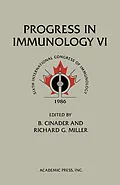Progress in Immunology VI: Sixth International Congress of Immunology contains the proceedings of the Sixth International Congress of Immunology held in 1986. The papers review advances that have been made in the field of immunology and cover topics ranging from ontogeny and differentiation of B and T lymphocytes to diversification of immunoglobulins and T cell receptors. Antigen presentation and processing, the complement system, and regulation of the immune response are also discussed.
Comprised of 105 chapters, this book first explores the developmental biology of the immune system by focusing on the origins of selective theories of antibody formation and the clonal selection hypothesis. Clonal selection and the problem of immunologic tolerance are also considered. Subsequent chapters deal with the structure and function of recognition structures; B cell subsets and B cell activation; T cell subsets and T cell activation; lymphokines and growth factors; and autoimmune disorders. The remaining sections are devoted to oncogenesis and tumor immunity; the response of the host to the environment; and host-graft relationship.
This monograph will be of interest to immunologists and biologists.
Inhalt
Contributors
Introduction
Developmental Biology of the Immune System
The Burnetian Legacy: A Clonal Selectionist Looks Toward the 1990s
Ontogeny and Differentiation of B Lymphocytes
B Cell Development in Birds and Mammals
Generation of Diversity During B Cell Ontogeny in the Chicken
Molecular and Cellular Characteristics of Clonable Pre-B Cells
B Lymphocyte Genesis in the Bone Marrow
Ontogeny and Differentiation of T Lymphocytes
Role of Self Antigens in the Selection of the Developing T Cell Repertoire
Thymic Influences on T Cell Development
Role of Self-Reactivity in the Generation of the T Cell Specificity Repertoire
Ontogeny of T Cell Receptors for Antigen
Mature and Immature Thymocytes
Structure and Function of Recognition Structures
Diversification of Immunoglobulins and T Cell Receptors
Immunoglobulins
Three-Dimensional Structure and Specificity of Monoclonal Antilysozyme Antibodies
Mutation and Selection of Antibodies
The Influence of Somatic Mutation on the Immune Response
Fab Assembly: An Analysis of Different CH1 : CL Combinations
The T Cell Receptor Complex
Expression of the Antigen-Specific MHC-Restricted T Cell Receptor
Structural and Genetic Aspects of the T Cell Receptor-T3 Complex
Genes Encoding the a-, ß-, and -Chains of the Human T Cell Antigen Receptor
Class I and Class II MHC Products
Diversification of H-2 Genes through Recombination: A Study of Kb Mutants
The Regulation of Ia Gene Transcription
Antigen Presentation and Processing
Antigen Presentation: Paradigm Lost?
Interaction between Protein-Derived Immunogenic Peptides and Ia
The Molecular Context of a Determinant Influences Its Dominant Expression in a T Cell Response Hierarchy through "Fine Processing"
Antigen Internalization, Processing, and Recycling by Antigen-Presenting Cells
Immunodominance of Amphipathic Peptides and Their Localization on the Cell Surface for Antigen Presentation to Helper T Cells
The Complement System
Molecular Mechanisms of Cytotoxicity: Comparison of Complement and Killer Lymphocytes
Molecular Mechanisms in the Antibacterial Action of Complement
Cell and Molecular Biology of Human Complement Receptors
Molecular Biology of the Human Complement Class III Products of the MHC: Factor I and Its Cofactors
Molecular Regulation of Complement Gene Expression
Regulation of the Immune Response
Epirestriction and a Specialized Subset of T Helper Cells are Key Factors in the Regulation of T Suppressor Cells
B Cell Subsets and B Cell Activation
Regulation of B Lymphocyte Activation: The Roles of Receptor Cross-Linkage and B Cell Stimulatory Factor-1 (BSF-1)
B Cell Activation as a Consequence of Membrane Immunoglobulin-Mediated Antigen Presentation
Regulation of Human B Cell Differentiation: Molecular Structure and Immunological Functions of Human B Cell Differentiation Factor (BSF-2)
Idiotype-Directed Interactions During B Cell Ontogeny
Characteristics of Ly 1 B Cells
T Cell Subsets and T Cell Activation
Multiple Signals Required in Cytolytic T Cell Responses
Regulation of Activation of Cloned Murine T Cells
The Generation of the Repertoire of T Cell Specificities and Functions: Toward a Consistent Model
LM.19: A Novel Developmentally Regulated, Signal-Transducing Lymphocyte Antigen
Adaptive Construction of the Immune Circuit
Lymphokines and Growth Factors
Lymphokines and Growth Factors: Interleukin-2 as a Prototype Lymphocytotrophic Hormone
Interleukin-1
Interferon- : Receptors and Effects on MHC Antigen Expression
Molecular Biology of Interleukin-2 and Its Receptor: The Current Status
Autoimmune Disorders
Autoantibodies and Normal Antibodies
The Use of Human T Cell Clones to Dissect HLA and Disease Associations
Resistance to Experimental Autoimmunity Using T Lymphocyte Vaccines
Molecular Genetics of Murine Lupus
Idiotypes and Autoimmunity
Congenital and Acquired Immunodeficiencies
The Human T Lymphotropic Retroviruses and Human Immune Deficiency
Cell Membrane Abnormalities Leading to Immune Deficiency
Role and Molecular Biology of the Interleukin-2-Interleukin-2 Receptor System in Health and Disease
Immunodeficiency Disease: Pathogenesis and Treatment
Immune-Neuroendocrine Interactions
Immune-Neuroendocrine Network
Noradrenergic Sympathetic Innervation of Spleen and Lymph Nodes in Relation to Specific Cellular Compartments
Transmembrane Signaling Mechanisms in Neuroendocrine Modulation of the Thymus-Dependent Immune System
Bidirectional Pathways Between the Brain and Immune System: A Role for Thymosin Peptides
A Molecular Basis for Bidirectional Communication Between the Immune and Neuroendocrine Systems
Oncogenesis and Tumor Immunity
Oncogene Activation by Chromosomal Translocations in B Cell-Derived Tumors
Neoplastic Transformation of Lymphoid and Myeloid Cells
Pathogenesis of Lymphoid and Myeloid Tumors
Chronic Myelogenous Leukemia as a Model System for Stem Cell Growth Regulation and Hematolymphoid Development
Mechanisms of Lymphoma Induction by Retroviruses
Lessons from Translocations and Transgenic Mice: Constitutive c-myc Expression Predisposes to Neoplasia
Induction, Expression, and Manipulation of Immunity to Tumors
The Role of Major Histocompatibility Complex Class I Antigens in Antitumor Immunity
Monoclonal Antibody Targeting of Cytotoxic Agents for Cancer Therapy
Tumor-Specific Antigens on Experimental Tumors
New Approaches to the Immunotherapy of Cancer Based on the Systemic Administration of Lymphokine-Activated Killer Cells and Recombinant Interleukin-2
Carcinoembryonic Antigen and Its Utility in the Diagnosis of Colonie Adenocarcinoma
Response of the Host to the Enviro…
